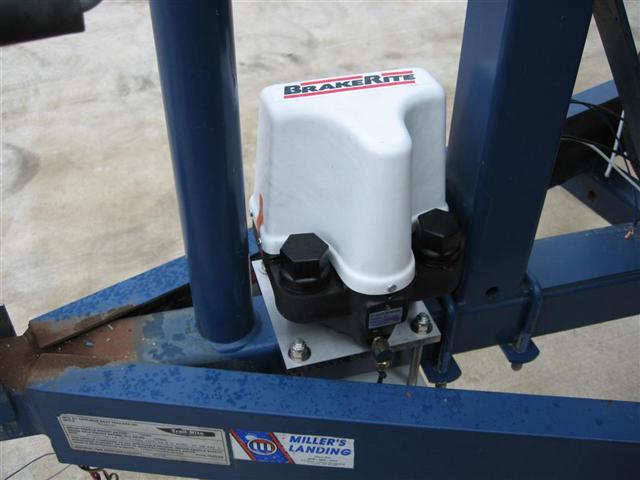PondTunes
Petty Officer 1st Class
- Joined
- Jun 7, 2007
- Messages
- 387
Re: Electric or hydraulic brakes
My original trailer for my 28' pontoon boat was 53" wide from rail to rail. It rode between the toons and had no brakes.

Even walking on the boat while it was on the trailer you could feel the boat sway and move. Pulling it was even more un-nerving as it felt like it wanted to tip over even around the most mild curves.
So I sold the above trailer for $1000.00 on craigslist and started building a new one. I ended up building a float on and put electric brakes on both axles. Total end cost including LED lighting was about $1800.00 The trailer has 3500 lb axles under it which are overkill but 3500 lb wasn't much more expensive than the light duty ones. I picked pure electric brakes because I already had an electric brake controller installed in my truck from the factory.

$700.00 - Axles w/ brakes, Wheels, Tires, Springs & Shackles
$800.00 - The frame is 5" Steel C Channel, 4" channel make up the bracing and tongue, the angle bracing is 1/4" Angle iron. Various steel plates for gussets & bracing.
$90.00 - LED Tail/Turn Lights & Clearance/Marker Lights, + Wiring.
$40.00 - 1/2 Gallon Penetrol (For priming) 1/2 Gallon Rustoleum Black
$70.00 - Lumber/Carpet/Glue for bunks & center walkway.
$100.00 - Safety chains, Coupler, trailer jack, wiring harness to fit truck plug.
The difference is night and day. The boat pulls like a dream now, it doesn't wobble or sway when turning. When set properly the brakes will engage and will stop on a dime. Too low and they don't help much, too high and they will slide the trailer tires. The trailer also backs much easier than the previous trailer (mostly due to the wheels being back a little farther)
To answer the actual question at hand tho:
I would venture to say that ANY brakes are better than NO brakes.
If you don't have anything with electric brakes or a brake controller you will need to either install or have one installed in your tow vehicle.
Then you'll need to buy a set of brakes to fit your axles, these also require some minor wiring.
Surge brakes work on inertia; the coupler will move as the tow vehicle's brakes are applied this movement moves a piston which pushes fluid into the brakes. the harder you stop the tow vehicle the harder the trailer stops.
For this setup you will have to have to replace the brakes (wonder why they were cut in the first place) run new brake lines (more difficult than a couple of wires) and install a coupler/master cylinder. Most couplers also offer a reverse lockout so that when you are backing the brakes are disabled, most of the time this isn't automatic but I'm sure automatic ones are offered that could be connected to your reverse light or a toggle switch.
My original trailer for my 28' pontoon boat was 53" wide from rail to rail. It rode between the toons and had no brakes.

Even walking on the boat while it was on the trailer you could feel the boat sway and move. Pulling it was even more un-nerving as it felt like it wanted to tip over even around the most mild curves.
So I sold the above trailer for $1000.00 on craigslist and started building a new one. I ended up building a float on and put electric brakes on both axles. Total end cost including LED lighting was about $1800.00 The trailer has 3500 lb axles under it which are overkill but 3500 lb wasn't much more expensive than the light duty ones. I picked pure electric brakes because I already had an electric brake controller installed in my truck from the factory.

$700.00 - Axles w/ brakes, Wheels, Tires, Springs & Shackles
$800.00 - The frame is 5" Steel C Channel, 4" channel make up the bracing and tongue, the angle bracing is 1/4" Angle iron. Various steel plates for gussets & bracing.
$90.00 - LED Tail/Turn Lights & Clearance/Marker Lights, + Wiring.
$40.00 - 1/2 Gallon Penetrol (For priming) 1/2 Gallon Rustoleum Black
$70.00 - Lumber/Carpet/Glue for bunks & center walkway.
$100.00 - Safety chains, Coupler, trailer jack, wiring harness to fit truck plug.
The difference is night and day. The boat pulls like a dream now, it doesn't wobble or sway when turning. When set properly the brakes will engage and will stop on a dime. Too low and they don't help much, too high and they will slide the trailer tires. The trailer also backs much easier than the previous trailer (mostly due to the wheels being back a little farther)
To answer the actual question at hand tho:
I would venture to say that ANY brakes are better than NO brakes.
If you don't have anything with electric brakes or a brake controller you will need to either install or have one installed in your tow vehicle.
Then you'll need to buy a set of brakes to fit your axles, these also require some minor wiring.
Surge brakes work on inertia; the coupler will move as the tow vehicle's brakes are applied this movement moves a piston which pushes fluid into the brakes. the harder you stop the tow vehicle the harder the trailer stops.
For this setup you will have to have to replace the brakes (wonder why they were cut in the first place) run new brake lines (more difficult than a couple of wires) and install a coupler/master cylinder. Most couplers also offer a reverse lockout so that when you are backing the brakes are disabled, most of the time this isn't automatic but I'm sure automatic ones are offered that could be connected to your reverse light or a toggle switch.




















